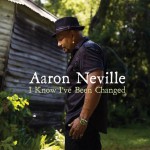
In a city of maddening talents, Aaron Neville’s has been one of the most perplexing. His voice is a remarkable instrument that has too often been employed for pedestrian purposes. It’s hard to argue with his drift toward MOR—he’s not getting younger, and underpaid R&B legends are a dime a dozen—but people have wanted something more substantial: The angelic desire of “Tell It Like It Is;” the streetwise grit of “Hercules;” the spirituality of “Amazing Grace.” Next to those, another version of “Everybody Plays the Fool” is likable but disposable.
On I Know I’ve Been Changed, he has put his talents to excellent use. He’s singing gospel, and producer Joe Henry makes Neville’s voice and Allen Toussaint’s piano the focal points of each track. It’s Henry’s least obtrusive production, but you can hear subtle, smart decisions such as the choice to record the tambourines off-mic and with the treble rolled down. That keeps a native percussion instrument in the mix, evokes Mardi Gras Indians, but leaves plenty of room in the treble range for Neville.
The song choices are smart with few obvious selections, but Neville sings each with literal attention to the words. For the title track, he’s almost woozy with the good news, while he sings “Don’t Let Him Ride” as if he’s warning the listener about a trifling woman. Throughout, there’s an appealing buoyancy in his performances beyond his quaver, as if the transcendent subject matter has already lightened his load.
The arrangements don’t blur distinctions between gospel and other genres as much as they unify them. The frameworks reference country, folk and the blues, but Toussaint pulls them together by playing distinctly New Orleans piano accompaniment. His bounce spurs Neville’s inventiveness as a singer and adds a secondary charm to almost every track. His solo in “You’ve Got to Move” is as unexpected as it is compelling.
The blues and New Orleans underpinnings also show Henry’s hand a bit. His productions often treat American roots music as fine art, and here he uses beloved musical contexts to frame another genre—gospel—that has historically been so message-driven that those who don’t believe find it hard to stay with. He doesn’t betray the songs, the message or Neville, though. Instead, by integrating the songs in the history of American music—and particularly African-American music—he puts Aaron’s voice and art in a dynamic context, and one that music fans can easily return to, regardless of their beliefs.




